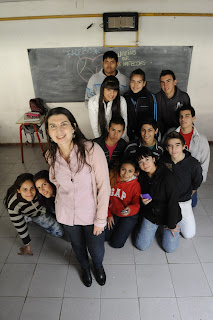 |
| Photo by Sebastián Suarez Meccia |
What is Brené´s message? Her research shows that connection is what gives purpose and meaning to our lives and that in order for connection to happen, we have to allow ourselves to be seen, deeply seen , VULNERABLY seen. Brené encourages us to face imperfection, to have the strength to love ourselves no matter what, and the courage to let go of who we think we should be and become who we really are.
What am I really like?
Well, most people think that because I’m a teacher and work with others I’m an extrovert, but in fact I’m not (in case you are interested my personality type, according to the Myers-Briggs test, is INTJ). I suppose saying I’m an “outgoing introvert” would be more appropriate. I’m challenged to put my feelings out there and when I feel insecure I usually wear my armour- nice and tight.
Of course this affects my professional life. I prefer interacting with students, the people I am familiar with, rather than with a wide circle of colleagues. I feel the classroom is my territory and I am comfortable there. I enjoy the autonomy and creative freedom making decisions on my own gives me.
However, a few months ago, I began asking myself: What would happen if I shared my points of view, if I let others scrutinise my work? Would I feel confident enough to face criticism (or applause)?
Shameless Ana
“You can be amazing, but if you do not share it, no one cares”, says actress/photographer Maya (better known as “Shameless Maya” on Youtube). With her bold an “ in your face” style Maya convinced me - I should embrace vulnerability and become “Shameless Ana” . After months of doubt I embarked on a journey of personal and professional development.
The first step was to give a presentation in front of more than 100 EFL teachers. Yes, I decided to start sharing classroom experiences with complete strangers. I knew making my reality visible was necessary to grow as a professional so when my colleague and ex-high school classmate Carla Raguseo told me about a conference in Villa María, Córdoba I decided to apply for a place in the “Teacher’s Forum”, and I got it. Carla and I gave our presentations on My 24th ( you can read a detailed post describing our experiences in her blog).
The first step was to give a presentation in front of more than 100 EFL teachers. Yes, I decided to start sharing classroom experiences with complete strangers. I knew making my reality visible was necessary to grow as a professional so when my colleague and ex-high school classmate Carla Raguseo told me about a conference in Villa María, Córdoba I decided to apply for a place in the “Teacher’s Forum”, and I got it. Carla and I gave our presentations on My 24th ( you can read a detailed post describing our experiences in her blog).
 I talked about Facebook in education and how I am using it with colleagues and students. The presentation was well received, so much so that the topic was mentioned in an article published on the UNVM website. And then, something amazing happened, a local newspaper got interested in the story, I was interviewed and an article was published. The impact of a front page story with a lovely photo was huge. My face, and my ideas, were everywhere!! A couple of days later, my students and I were interviewed, this time at school, and the story was...on TV! If you want to know more about this “media boom”, have a look at the brand new blog Carla and I have created and the article I wrote on my experience.
I talked about Facebook in education and how I am using it with colleagues and students. The presentation was well received, so much so that the topic was mentioned in an article published on the UNVM website. And then, something amazing happened, a local newspaper got interested in the story, I was interviewed and an article was published. The impact of a front page story with a lovely photo was huge. My face, and my ideas, were everywhere!! A couple of days later, my students and I were interviewed, this time at school, and the story was...on TV! If you want to know more about this “media boom”, have a look at the brand new blog Carla and I have created and the article I wrote on my experience.What have I learned?
Embracing your vulnerability, taking off your armour and sharing what you know (and what you DON’T know) is a powerful experience. It leaves you “naked”- and I know, that’s hard- but your ability to be okay with that can bring surprising results.
If you are still in doubt, just remember what Marianne Williamson says “Our deepest fear is not that we are inadequate. Our deepest fear is that we are powerful beyond measure. It is our light, not our darkness that most frightens us…Your playing small does not serve the world. There is nothing enlightened about shrinking so that other people won’t feel insecure around you. We are all meant to shine, as children do…And as we let our own light shine, we unconsciously give other people permission to do the same. As we are liberated from our own fear, our presence automatically liberates others.”

